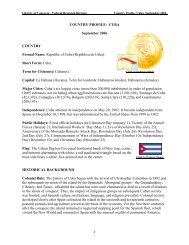1 - American Memory
1 - American Memory
1 - American Memory
Create successful ePaper yourself
Turn your PDF publications into a flip-book with our unique Google optimized e-Paper software.
11<br />
H.R. 7189, as well as S. 1566, pro\ades for a 160-day exemption for<br />
Hawaii and the other U.S. Pacific islands—Guam, <strong>American</strong> Samoa,<br />
and the Trust Territory of the Pacific Islands—from any west coast<br />
longshore or maritime strike or lockout.<br />
Hawaii is located in the heart of the North Pacific Ocean, nearly<br />
2,500 miles distant from the U.S. mainland.<br />
Our island economy is primarily export-import in nature. Nearly<br />
80 percent of all physical commodities must be imported. We depend<br />
on the U.S. mainland for much of our food, clothing, building ma-<br />
terials, and other necessities of modern life. Our economy depends on<br />
exports of sugar, pineapple, and textiles which move from Hawaii by<br />
sea.<br />
Some 99 percent of our imports and exports must move almost<br />
entirely by ship. "Wlien shipping is disrupted, the people and the econ-<br />
omy of Hawaii are hit, and hit hard.<br />
Shipping disruptions have come with devastating frequency since<br />
the close of World AVar IT. More than 4 years of transportation serv-<br />
ices have been lost in the 1946-72 period. The periods of dislocation<br />
due to anticipating, suffering through, and recovering from a strike<br />
probably bring the total period of disruption to more than 6 years—<br />
almost a quarter of the time elapsed since the end of the war.<br />
Shipping strikes mean lost jobs, business failures, higher prices,<br />
depleted savings, reduced tax revenues, loss of outside investment<br />
capital, and lost markets for Hawaii's exports. They also mean lost<br />
business and markets for mainland producers and suppliers whose<br />
goods are needed and purchased by the people of Hawaii, Mr. Chair-<br />
man and members of the committee, this is an intolerable situation.<br />
Yet, these stoppages almost invariably do not originate in Hawaii,<br />
have no participants in Hawaii, and are remote from any direct in-<br />
fluence which might be brought to bear bj' our local unions, manage-<br />
ment, and the force of public opinion in Hawaii.<br />
The requested IfiO-day exemption for Hawaii and the U.S. Pacific<br />
islands relates only to maritime or longshore strikes on the west<br />
coast. The pending bill. H.R. 7189, does not deal with strikes in<br />
Hawaii itself. Like any other State, Hawaii must continue to cope<br />
with work stoppages within its own borders.<br />
The exemption requested would involve only some 31^ percent of<br />
the longshore-hours worked on the west coast, and only about 7.3<br />
percent of the total man-days worked by shipboard labor with west<br />
coast contracts. Therefore. I believe that it would have little impact<br />
upon collective bargaining, a process to which I have long been deeply<br />
committed.<br />
Yet through its operation, this bill would provide Hawaii and the<br />
U.S. Pacific islands with the security of transportation services en-<br />
joyed by other States which have alternative means of surface trans-<br />
portation. It is a viable remedy for the economic hardship Hawaii<br />
sustains solely by reason of its geographical location.<br />
It is a fair bill. It is a workable bill. There is no present statutory<br />
remedy for Hawaii in cases of west coast maritime or longshore<br />
strikes—^no exemption, no partial operation, no guaranteed settlement<br />
procedure.<br />
I urge this subcommittee to give Hawaii relief from an intolerable<br />
situation. We appeal to you with a sense of urgency. June 30—only



![Albert Einstein Papers [finding aid]. Library of Congress. [PDF ...](https://img.yumpu.com/21604228/1/190x245/albert-einstein-papers-finding-aid-library-of-congress-pdf-.jpg?quality=85)





![American Colony in Jerusalem Collection [finding aid]. Library of ...](https://img.yumpu.com/17941275/1/190x245/american-colony-in-jerusalem-collection-finding-aid-library-of-.jpg?quality=85)



![Piccard Family Papers [finding aid]. - American Memory - Library of ...](https://img.yumpu.com/17941234/1/190x245/piccard-family-papers-finding-aid-american-memory-library-of-.jpg?quality=85)


